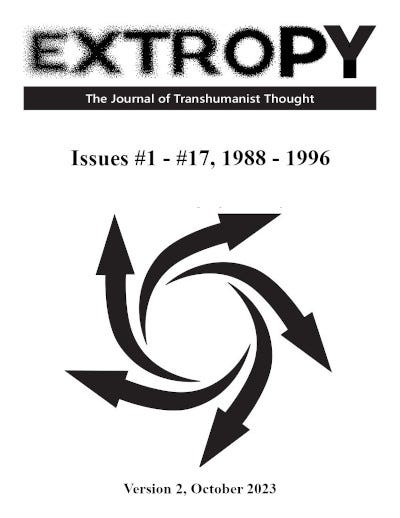Irrational mechanics, draft Ch. 4
Libertarian determinism.
Greetings to all readers and subscribers, and special greetings to the paid subscribers!
Please scroll down for the main topic of this newsletter. But first:

Mark your calendar! At the Terasem Colloquium on December 14, 2023, 10am-1pm ET via Zoom, stellar speakers will explore recent AI developments (ChatGPT & all that), machine consciousness, and the nature of consciousness. You are invited! Please note that a related issue of the Terasem’s Journal of Personal Cyberconsciousness (Vol. 11, Issue 1 - 2023) will be published in December. See the call for papers.
The Github repository Extropians includes archives of the mailing list Extropians from 1996 to 2003, and PDF scans of the late lamented print magazine Extropy.
There PDF scans of the Extropy magazine are in the subrepository Extropy, which I maintain.
A problem so far was that most of the text was not searchable and copyable.
I uploaded a new full set of Extropy Magazine PDFs, now with OCR, produced by Alessio Pecoraro from the previous scans. 95+ percent of the text is searchable and copyable, with the exception of a few points where the quality of the PDF scans was too poor.
I also produced a single downloadable PDF with all issues, slightly compressed (223 MB).
You can download it here, or you can download the individual files (marked “New PDFs with OCR, produced by Alessio Pecoraro”).
This is an intermediate milestone. The ideal outcome of this project would be a freely downloadable EPUB ebook with all the issues of the Extropy magazine, easily readable and well-formatted, with images, TOC, index and all.
In the meantime, If you have better scans of the individual issues, please upload them
to https://github.com/Extropians/Extropy.

From my book “Tales of the Turing Church” (2020): The Extropians list has been my main source of intellectual fun for years, with awesome futuristic ideas, science, science fiction, and a radically simple philosophy of empowerment. I met many good friends through the list, and I am proud of being one of the Extropy alumni. It’s worth noting that many ideas that today are all over the mainstream press were first discussed on the list.
At times I’ve criticized some extropian ideas: I think rationality is not the only tool in our mental toolbox; I think the ultratech that we want to see will come much more slowly than we hope, and won’t create a perfect Utopia; I am not obsessed with life extension and I look forward to finding out WTF happens after death (this is the title of a chapter in my next book); and I disagree on one or two other little points. But overall, my spirit is Extropian.
A couple of days ago Marc Andreessen has published a great “Techno-Optimist Manifesto” (republished in the Andreessen Horowitz (a16z) website). Read it. Then read it again. Then read it again and share it. Then go out and say these things loud and clear. The world needs more techno-optimism and more of the libertarian spirit of Extropy.
So here’s a very early draft of Chapter 4 of my new book “Irrational mechanics: Narrative sketch of a futurist science & a new religion” (2024).
Note that this and the others draft chapters are very concise. At this point I only want to put down the things I want to say, one after another. Later on, when the full draft for early readers is complete, I’ll worry about style and all that.
4 - Libertarian determinism
In this chapter I’ll outline concepts of determinism that leave room for free will, and make a lot of sense to me. Let me repeat the question at the end of the last chapter: do we only seem to be free agents for all practical purposes, or are we really free agents?
Nicolas Gisin has an interesting answer [Wolchover 2020] based on an interpretation of classical mechanics. Classical mechanics is deterministic only if initial conditions are specified as infinitely precise real numbers with infinite bits that are given all at once. But this is impossible, and seems “to have no physical meaning” [Born 1969]. Most real numbers are infinite sequences of random bits [Chaitin 2005] that contain infinite information.
Chaos theory shows that a vanishingly small change in initial conditions can, and very often does, make a big difference [Stewart 1997, Stewart 2019]. Therefore, watching what actually happens is often the only way to determine more bits in the initial conditions.
If a bit of information can’t be determined until a certain time, then it can’t be said to physically exist until that time. Gisin proposes to consider physically real numbers as physical processes, sequences of bits that unfold in real time. New bits in the initial conditions are determined by physical facts in the present that require them. “The new digits really get created as time passes” [Wolchover 2020]. So instead of the past determining the present, it is the present that determines the past (retrocausality).
This idea, which can be generalized to all mathematical physics similar to classical mechanics, makes free will real. Not apparently real, not real for all practical purposes, but really, physically real. Gisin relates this idea to mathematical intuitionism [Posy 2020], a somewhat Bergsonian and at the same time somewhat positivist approach to mathematics developed in the early 20th century [van Dalen 2013].
We can “understand the present as the result of indeterminate reality, and the future as open,” says Gisin [Gisin 2019]. If we care about how we experience reality, this option “is obviously superior.”
I think Gisin has a healthy perspective: it is our mathematics that must adapt to what happens in physical reality, not the other way around.
Now let me introduce my favorite way out of the conflict between determinism and free will. This way out is based on global determinism: what happens in the universe, anywhere and at any time, is uniquely determined by the whole universe of space and time, but not by anything less than the whole spacetime - in particular, it is not uniquely determined by the past of the universe. Emily Adlam suggests a clear formulation of global determinism: the universe doesn’t compute itself locally in space and time, place by place and instant by instant, but all at once globally and self-consistently.


